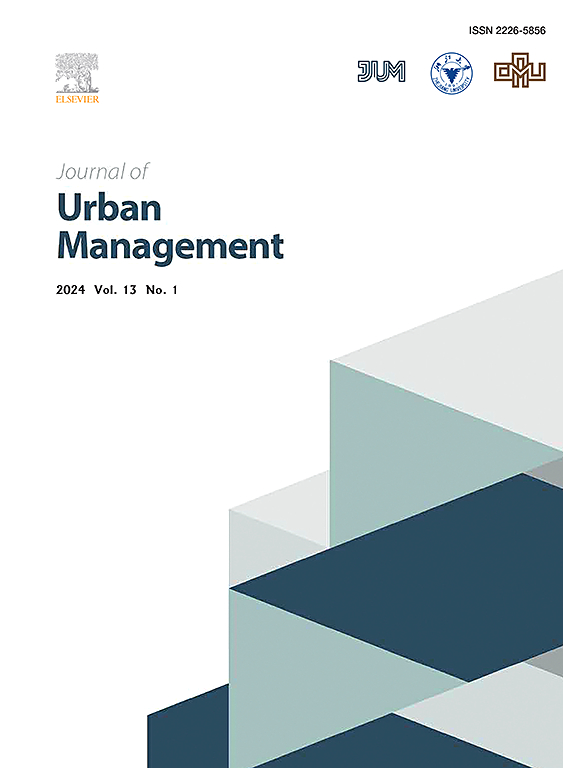可持续智慧城市关键成功因素的结构方程模型:以阿布扎比为例
IF 5
2区 社会学
Q1 URBAN STUDIES
引用次数: 0
摘要
近年来,由于城市化和数字化的加速发展,可持续智慧城市(ssc)受到了广泛关注。SSC计划的主要目标是将数字技术无缝集成到城市的基础系统中,最终提高市民的生活质量。鉴于此,我们进行了一项研究,以确定阿布扎比向SSC转型所需的关键成功因素(CSFs)。这些csf是通过文献调查确定的,并通过半结构化访谈和问卷调查由从业人员进一步确认。通过这些方法,研究证明了SSC实施与CSFs之间的相关性。考虑到这一点,该研究确定了四个主要类别的22个csf:人员和社区、治理、技术、管理和组织。然后,该研究为阿布扎比优先考虑了这些csf,强调了最终用户参与、问责制、良好沟通以及项目团队技能和经验在促进SSC倡议实施方面的重要性。最终,在设计ssc时考虑和优先考虑csf,以确保它们真正造福公民和经济,这一点至关重要。这项研究为世界各地的城市提供了一个有用的框架,这些城市希望创建和实施SSC倡议,以提高其公民的生活质量。本文章由计算机程序翻译,如有差异,请以英文原文为准。
A structural equation model of the critical success factors for sustainable smart cities: A case study of Abu Dhabi
Sustainable Smart Cities (SSCs) have garnered significant attention due to the accelerating rate of urbanization, and digitalization recently. The main objective of SSC initiatives is to seamlessly integrate digital technology into the city's fundamental systems, ultimately enhancing the citizens' quality of life. In light of this, a study was conducted to pinpoint the Critical Success Factors (CSFs) necessary for Abu Dhabi's transformation into SSC. These CSFs were identified via an investigation of the literature and further confirmed by practitioners via semi-structured interviews and questionnaires. Through these methods, the research demonstrated a robust correlation between SSC implementation and CSFs. With this in mind, the study identified 22 CSFs across four primary categories: people and communities, governance, technology, and management and organization. The study then prioritized these CSFs for Abu Dhabi, highlighting the importance of end-user involvement, accountability, good communication, and project team skills and experience in boosting the implementation of SSC initiatives. Ultimately, it is crucial to consider and prioritize CSFs when designing SSCs to ensure that they truly benefit citizens and the economy. This research provides a useful framework for cities around the world looking to create and implement SSC initiatives that will enhance their citizens' quality of life.
求助全文
通过发布文献求助,成功后即可免费获取论文全文。
去求助
来源期刊

Journal of Urban Management
URBAN STUDIES-
CiteScore
9.50
自引率
4.90%
发文量
45
审稿时长
65 days
期刊介绍:
Journal of Urban Management (JUM) is the Official Journal of Zhejiang University and the Chinese Association of Urban Management, an international, peer-reviewed open access journal covering planning, administering, regulating, and governing urban complexity.
JUM has its two-fold aims set to integrate the studies across fields in urban planning and management, as well as to provide a more holistic perspective on problem solving.
1) Explore innovative management skills for taming thorny problems that arise with global urbanization
2) Provide a platform to deal with urban affairs whose solutions must be looked at from an interdisciplinary perspective.
 求助内容:
求助内容: 应助结果提醒方式:
应助结果提醒方式:


